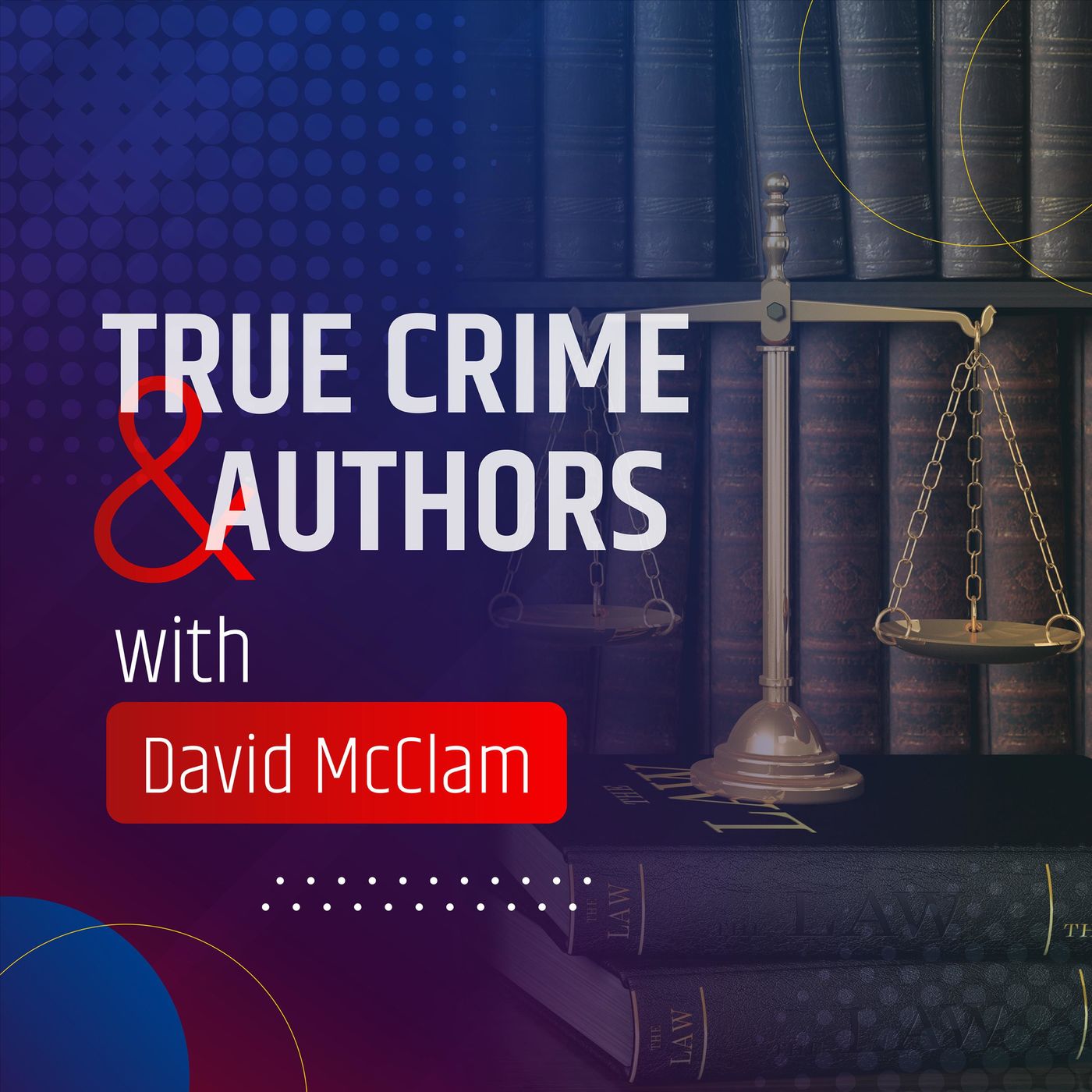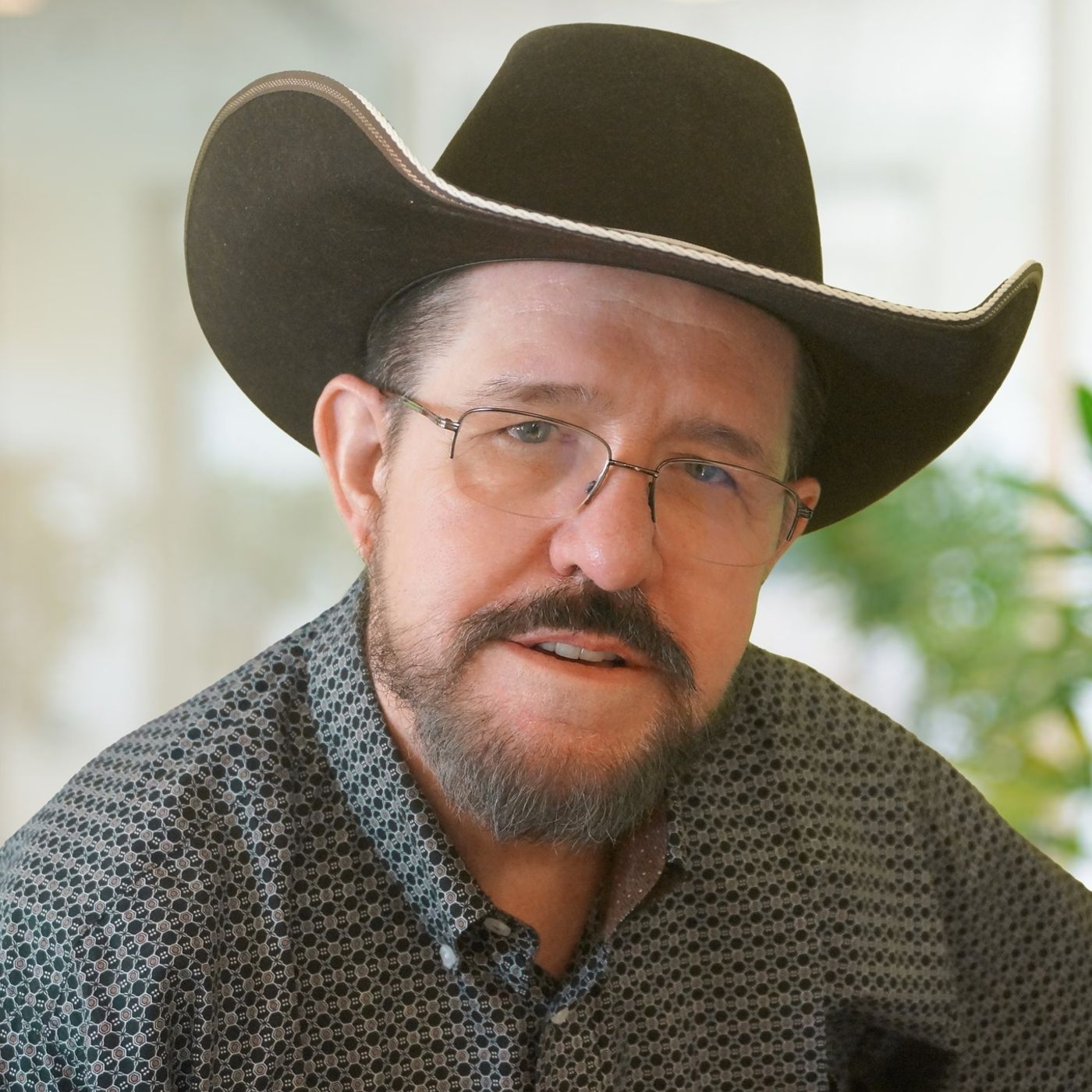The Madness of John Terrell With Author Stephen Terrell
Stephen Terrell, a novelist and retired attorney, shares the gripping story of his great-uncle John Terrell, who became notorious for a murder that shocked Indiana in 1903. Terrell's book, "The Madness of John Terrell: Revenge and Insanity on Trial in the Heartland," delves into the complexities of family history and the dark legacy that can emerge from it. As Stephen recounts the intriguing details of John’s life, including his rise to wealth through oil discovery and the tragic events that led to the fatal confrontation with his son-in-law Melvin Wolf, listeners gain insight into the societal issues of the time, such as bullying and mental health struggles. The discussion also touches upon the legal proceedings that followed, highlighting the stark contrasts in public perception of John Terrell as both a respected businessman and a man driven to violence. This episode not only uncovers a captivating true crime narrative but also invites reflection on enduring social challenges that echo through history.
Get your Copy of The Madness Of John Terrell Revenge and Insanity on trial in the heartland HERE
Takeaways:
- The podcast discusses the complex history of the Terrell family, including a notorious murder case from the early 1900s.
- Stephen Terrell's book, 'The Madness of John Terrell,' explores themes of family, violence, and societal perceptions of morality.
- The trial of John Terrell revealed deep community divisions regarding his character and actions, influenced by his atheism.
- Throughout the episode, the importance of sharing stories and understanding our family histories is underscored.
- Listeners are encouraged to reach out for help if they or someone they know is struggling with suicidal thoughts.
DON'T FORGET TO RATE, COMMENT AND SUBSCRIBE
JOIN ME ON SOCIAL MEDIA BY FOLLOWING THE LINKTREE
Follow Our Family Of True Crime Shows
Deep Dark Secrets with LaDonna Humphrey & Amy Smith
True Crime, Authors and Extraordinary People With David McClam
Extinguished With David McClam & LaDonna Humphrey
Cover Art and Logo created by Diana of Other Worldly
Sound Mixing and editing by David McClam
Intro script by Sophie Wild From Fiverr & David McClam
Intro and outro jingle by Jacqueline G. (JacquieVoice) From Fiverr
00:00 - Untitled
00:05 - Understanding the Impact of Suicide
03:38 - Discovering Family Secrets
09:48 - The Story of Melvin and the Terrell Family
19:40 - The Legacy of John Terrell and Its Psychological Impact
26:01 - Exploring Historical Issues: A Reflection on Crime and Society
28:28 - Untitled
You are seen, you are worthy.
Stephen TerrellYou are not alone.
Stephen TerrellThe world loses one person to suicide every 40 seconds.
Stephen TerrellLet's change the stats together.
Stephen TerrellWe can say not suicide.
Stephen TerrellNot today.
David McClamWelcome to True Crime Authors and Extraordinary People, the podcast where we bring two passions together.
David McClamThe show that gives new meaning to the old adage truth is stranger than fiction.
David McClamAnd reminding you that there is an extraordinary person in all of us.
David McClamHere is your host, David McClam.
Host (David McClam)What's going on, everybody?
Host (David McClam)And welcome to episode of True Crime Authors of Extraordinary People, of course, I'm your man, David McClam.
Host (David McClam)If you guys haven't already, make sure you follow us on all of our social media.
Host (David McClam)One link to a link tree will get you every place you need to go pertaining to the show.
Host (David McClam)As you heard coming in, if you or you know someone that is thinking about hurting yourself or others, please Stop this episode D988.
Host (David McClam)It is a suicide prevention hotline.
Host (David McClam)They will give you the help you need.
Host (David McClam)Remember, there is nothing in this world that is worth your life.
Stephen TerrellAll right.
Host (David McClam)If you pay attention to the calendars, you know it is time for yet another fabulous author.
Host (David McClam)I have a good one for you today.
Host (David McClam)Let me tell you who our guest is.
Host (David McClam)He is a novelist and retired Indiana attorney with decades of experience in trials and appeals at the state and federal levels.
Host (David McClam)He has been a frequent speaker at legal conferences and seminars and was selected to the Indiana State Bar Association's General Practice hall of Fame.
Host (David McClam)He is the author of the Madness of John Terrell, Revenge and Insanity on Trial in the Heartland.
Host (David McClam)Please welcome author Stephen Terrell.
Host (David McClam)Hey, Stephen.
Host (David McClam)Welcome to the show.
Stephen TerrellThank you very much.
Stephen TerrellIt's great to be here.
Host (David McClam)It is my honor and privilege to have you here today.
Host (David McClam)Let me start by saying happy belated pub day as your book just did release on October 29th of 2024.
Host (David McClam)How does it feel?
Stephen TerrellIt.
Stephen TerrellIt feels great.
Stephen TerrellIt was a long time coming with this book.
Stephen TerrellAbout three and a half, four years in the writing and the research and the editing of it.
Stephen TerrellBut it was a great publication day.
Stephen TerrellI did the release, the launch party, if you will, at the Wells County Public Library, which is in the county seat of Bluffton, where all of this book took place, or most of it.
Stephen TerrellAnd it was fascinating being there.
Stephen TerrellHad a large crowd, basically standing room only, and sold all the copies of the book I had with me.
Stephen TerrellSo, no, it was a good day.
Host (David McClam)Well, before we get into this book, which is very fascinating, let me ask you, is there anything else about Steven Terrell that we should know that we.
Stephen TerrellDon'T Well, I think you generally covered it in your introduction.
Stephen TerrellI am a retired lawyer, practice for 40 plus years basically centered around litigation and yeah, and then I always wrote on the side.
Stephen TerrellAnd when I retired I stumbled onto this story and spent a good part of the last, as I said, last three and a half, four years working on it and writing it, researching it.
Host (David McClam)So let's jump into that because this is where it becomes very fascinating.
Host (David McClam)John Terrell is related to you.
Host (David McClam)This is back believe in the 1800s.
Host (David McClam)You were bored during the pandemic from what I read and you started digging through your family tree.
Host (David McClam)Can you tell us a little bit about how you decided to do that and what led to this story?
Stephen TerrellI've always had an interest in family stories and in fact quite a few of my short stories had their genesis with family stories and I took them and then ran with the stories.
Stephen TerrellMy family was very large and I was at the very young end of it.
Stephen TerrellYou wouldn't guess it by looking at me now, but I had more than 40 aunts and uncles and they passed down lots of stories.
Stephen TerrellAnd so I had an interest in family genealogy, had done some work on it before.
Stephen TerrellBut when the pandemic hit and I had a, had just retired, had a lot of time here and decided to do a little more in depth work on my family tree.
Stephen TerrellAnd then I stumbled upon my great uncle who I had no knowledge of at all.
Stephen TerrellJohn Wesley Terrell.
Stephen TerrellThe first thing I did after I found his death and birth dates was I did a search on Newspapers.com for his death notice.
Stephen TerrellI had his death notice, his death date in 1916.
Stephen TerrellAnd so I searched on papers in the area where I live and where I thought he likely lived or grew up.
Stephen TerrellAnd sure enough the first story that popped up referred to the notorious John Terrell and his murder of his son in law which had captivated Indiana back in 1903.
Host (David McClam)You know, doing these family tree researches.
Host (David McClam)It happened to me too.
Host (David McClam)I have like some great uncle that was a part of some big robbery back in the day.
Host (David McClam)So I went down the rabbit hole too.
Host (David McClam)I'm like man, is this guy really related to me?
Host (David McClam)Is this really true?
Host (David McClam)So sometimes when we do these, you know, these family tree researches, we find things that we never knew.
Host (David McClam)Sometimes we find things we don't want to know.
Stephen TerrellYeah, I, I wrote an article when I found this.
Stephen TerrellI, I do a column for the American Bar association and I wrote a column for them not long after I found out about this.
Stephen TerrellIt was about finding a murderer in their family tree.
Stephen TerrellAnd the gist of it was before, you know, you read advertisements, you see them on television about people finding out they're related to some king or some hero or whoever.
Stephen TerrellWell, the bad guys have.
Stephen TerrellSome have relatives, too.
Stephen TerrellAnd so before you start, as you said, going down that rabbit hole, you might want to think a bit now.
Host (David McClam)Before we get into some of the other parts.
Host (David McClam)One of the other things you did find out about your great uncle is that he was the wealthiest man in Wills county after he discovered oil in his land.
Host (David McClam)Now, when I'm reading this part, forgive me if you haven't heard this before, but it kind of sounded like the Beverly Hillbillies to me because as you could, going on the same thing, Jack Clampet did you.
Host (David McClam)They wanted to move to Beverly Hills.
Host (David McClam)He moved to another town with a bigger house.
Host (David McClam)How did that part make you feel that he was actually a very wealthy man?
Stephen TerrellOh, actually, I didn't have much of a reaction other than surprise.
Stephen TerrellBut I did know a little bit about Indiana history and the gas and oil booms in Indiana in the 1880, late 1880s, up through the early 1900s.
Stephen TerrellAnd so it was a little bit of a surprise to see this, but not a shock.
Stephen TerrellI.
Stephen TerrellYou aren't alone about the Beverly Hills Beverly Hillbillies reference.
Stephen TerrellI had a little bit of thoughts about that, except the difference here was that John was a very astute businessman, and he already was an astute businessman before he ever struck oil on his property.
Stephen TerrellBy the end of 1896, he had six oil wells producing on his property, and he was buying business property, buying farm property, was talking with some businessmen about forming a bank.
Stephen TerrellSo he was a very shrewd and sharp businessman, unlike the Persona of Jed Clampett.
Host (David McClam)You definitely get that because in the part of your book where the guy comes and says, well, here's your answer, because he had been asking how far deeper you got to go to get oil, and the guys was covered in it.
Host (David McClam)And he says, isn't this losing money?
Stephen TerrellYeah.
Host (David McClam)So you totally get that business end of him.
Host (David McClam)At the very beginning of your book where you thanked people, you were thinking various family members, and you said, thank you for the stories, even though they hadn't talked to you about this one.
Host (David McClam)Why do you think they never brought this one up to you?
Stephen TerrellI don't know.
Stephen TerrellIt's.
Stephen TerrellI mean, the obvious answer is that people didn't want the black sheep of the family, so to speak, to be known for that story to be passed around about the Terrell family.
Stephen TerrellAnd it really does Surprise me.
Stephen TerrellAs far back as that was, I'm surprised that it, the story didn't get passed down at least to some extent.
Stephen TerrellI have a cousin who also is very knowledgeable about my aunts and uncles who were, you know, by the time I came along, quite older.
Stephen TerrellAnd he was very interested in genealogy also.
Stephen TerrellAnd he confirmed from his standpoint that he had never heard this story.
Host (David McClam)Wow.
Host (David McClam)Well, I do want to tell the audience, even though that you do say we're just going to talk about Melvin here in a second, that he does that he did kill his son in law in the very beginning of the book.
Host (David McClam)I want people to go buy this because you know, that is not the end of it.
Host (David McClam)So don't think he gave you the story.
Host (David McClam)He actually pulls it back and he goes into, in depth into the story of everybody, including John Terrell.
Host (David McClam)So when it comes to Melvin, what's your thoughts on Melvin?
Stephen TerrellWell, if I can just pause on and follow up on point you made there a bit that's a point I make in my presentations is that this isn't just a story about a murder.
Stephen TerrellThere are lots of true crime books out there that are, you know, and.
Stephen TerrellBut once you tell the story of the murder, that's just a small part of this because it really is the story of these three people.
Stephen TerrellAnd in fact, even more than that, if you count John's wife who we talk about, I talk about books, I'm sure, you know, it's a story about people.
Stephen TerrellIt's a story about a time when a lot of people have misperceptions about what the world was like at, at the turn of the century in rural America.
Stephen TerrellAs for Melbourne, you know, I tagged him as the cat of Wells county and I think that pretty well sums it up.
Stephen TerrellI mean in 1903, you know, every generation I think thinks it invents sex.
Stephen TerrellAnd every generation is wrong because it's been around a long time.
Stephen TerrellAnd Melvin, you know, got two girls knocked up by the time he was what, 21 years old.
Stephen TerrellHe first got a young 15 year old girl pregnant and there's fascinating little story about her in the footnotes of the book.
Stephen TerrellBut then he got Lucy pregnant.
Stephen TerrellJohn's youngest daughter.
Stephen TerrellYeah, he was, he was a young man.
Stephen TerrellHis father was relatively wealthy who was certainly well regarded in community.
Stephen TerrellHe ended up I think trying to take.
Stephen TerrellAnd he was according to descriptions and according to the picture we have of him, he's a very good looking young man.
Stephen TerrellAnd he didn't apparently hesitate to take advantage of that.
Host (David McClam)Yeah, he Definitely did seem like, seemed like the playboy from back in that day.
Host (David McClam)And I agree with you on that because when I read this stuff, you know, I was born in 72 and a lot of people don't talk about, you know, the sexual revolution that happened in 1800, 1900s.
Host (David McClam)And you're right, everybody thinks it's just something new within our time frame, but it really wasn't.
Host (David McClam)Everything that we have now was created long before us.
Host (David McClam)John, though, do we think?
Host (David McClam)Because I feel like Melvin kind of antagonizes him a little bit.
Host (David McClam)Is he kind of known around the town as a no nonsense kind of guy?
Host (David McClam)Does people think John Terrell is a bad man at this point?
Stephen TerrellWell, there's a difference of opinion about him and you'll see that come out when you read the section about the trial.
Stephen TerrellThere was a lot of evidence that came in about his reputation for his moral standing in the community and also his reputation for, for being violent in the community.
Stephen TerrellAnd so it went both ways.
Stephen TerrellYou had at the trial, in rebuttal, at the trial, you had some of the most prominent citizens in all of Wells county, you know, office holders, bank presidents, insurance company presidents, all these people who came in and testified about John's upstanding reputation.
Stephen TerrellAnd yet on the other side, you had a lot of people come in and testify about his, his lack of good morals.
Stephen TerrellAnd that was primarily based, and this was a 1903 trial that was primarily based on the fact he was an atheist.
Stephen TerrellAnd that did not set well and Wells county in 1903.
Stephen TerrellAnd to be honest, it wouldn't set well in Wells county today.
Stephen TerrellAnd the interesting thing about that with John was the fact that his father, my great grandfather, and his grandfather, my great great grandfather, were both fundamentalist preachers.
Stephen TerrellAnd yet John was very much an avowed atheist.
Host (David McClam)I'm going get into trial in a minute, but I do have the interesting question.
Host (David McClam)So in the part of the book where Melvin decides that he wants to, in my opinion, antagonize John, he's riding by in his horse and boogie doing things he shouldn't be doing.
Host (David McClam)Do you think for any instance that he felt like John was dangerous or would shoot him because he keeps saying, well, what is that old man going to do?
Stephen TerrellYeah, I, I don't think that that crossed Melvin's mind.
Stephen TerrellThat's a guess on my part.
Stephen TerrellI don't have any firm evidence one way or another.
Stephen TerrellBut based on his actions, he had been antagonizing not just John, but Lucy.
Stephen TerrellThey were separated is the modern term.
Stephen TerrellAt the Time.
Stephen TerrellAnd also antagonizing John's son and antagonizing John's two daughters and their families, doing things like running them off the road with his wagon, flashing his gun in one instance, having his good buddy, who was known as a brute around the community, a thug, had him confront John's son and threatened him, in fact, even slapped on John's son Jacob.
Stephen TerrellThis guy slapped Jacob's girlfriend, later his wife.
Host (David McClam)Wow.
Host (David McClam)So kind of, in a way, I mean, I don't condone violence of any kind, but I do feel like that sometimes people pushes us to that limit.
Host (David McClam)Do you, even if you didn't like the guy, do you think without all of the antagonizing that Melvin did, that this would have ever happened?
Stephen TerrellOh, no, no, I don't think it would.
Stephen TerrellI think it was caused by his antagonist, antagonist antagonizing of John and John's family.
Stephen TerrellHis abuse of.
Stephen TerrellOf Lucy, which was severe.
Stephen TerrellHis abuse of the other members of the Tero family.
Stephen TerrellAnd I think it just.
Stephen TerrellThat one day it just snapped and he was going to put an end to it.
Host (David McClam)Now back to the trial.
Host (David McClam)There is a lot that goes to the trial.
Host (David McClam)You guys need to read that.
Host (David McClam)But the most captivating part, and I think you kind of hit a little bit on it, is, is that he was done with.
Host (David McClam)In 15 minutes they came back with the verdict.
Host (David McClam)Do you think that that was fair?
Host (David McClam)You touched on him being atheist, you know, Bible belt back in that day.
Host (David McClam)Do you think that was fair or they did use that against him?
Stephen TerrellOh, I think it's hard to.
Stephen TerrellTo say what goes on in a jury's mind.
Stephen TerrellThey certainly made up their mind long.
Stephen TerrellThe trial went on.
Stephen TerrellThe transcript, which I found was 2500 pages long.
Stephen TerrellThe trial lasted three weeks and that included numerous night sessions.
Stephen TerrellI'm sure that jury made up its mind despite instructions for them not to make up their mind before they are given the case.
Stephen TerrellI'm sure they discussed it and they knew what they were going to do.
Stephen TerrellThe vote was 12 to 0 on the first vote to convict.
Stephen TerrellThe only multiple ballots they had, they had three ballots on what his sentence should be.
Stephen TerrellNone of the jurors voted for the death penalty, which was on the table.
Stephen TerrellAnd 11 to 1 they voted in favor of life in prison.
Stephen TerrellAnd it did not take.
Stephen TerrellThere was one vote, one person to wanted to give a lighter sentence, but it only took him two votes and he folded.
Stephen TerrellAnd they came back with the jury verdict in about 15 minutes from the time they started considering it.
Stephen TerrellThat, by the way, just point out there are several other jury things in this matter.
Stephen TerrellThere was a subsequent jury trial about John sanity.
Stephen TerrellThere was a jury trial about a guardianship and John sanity.
Stephen TerrellThere was a trial between Melvin and Lucy on fraudulent marriage.
Stephen TerrellIn all three of those instances, the jury was only out five, ten minutes.
Host (David McClam)Oh, wow.
Host (David McClam)Now, I won't give it away, but I will tell the audience after he shoots Melvin, that's not the end.
Host (David McClam)Got to read this for yourself.
Host (David McClam)But do you think that the mind was already made up because of the brutality of how everything unfolded?
Stephen TerrellWell, first of all, you have to keep in mind I always found this fascinating.
Stephen TerrellThe number one reason why jurors were kept off the jury panel was their opposition to the death penalty.
Stephen TerrellAnd one could argue that, you know, the jurors that were opposed to a death penalty might have been more receptive to listening to a defense.
Stephen TerrellThe second aspect of it was, and the state made a really good case of this.
Stephen TerrellThe initial case the state put on only took about a day and a half.
Stephen TerrellAnd the emphasis of the lawyers was a team of lawyers on both sides.
Stephen TerrellAnd the emphasis of the lawyers for the prosecution was put on that no man should be allowed to take the law into his own hands.
Stephen TerrellNo matter what Melvin did.
Stephen TerrellIt wasn't John Terrell's place to take the law into his own hands.
Stephen TerrellAnd it did seem that that message got across very clearly to the jurors.
Host (David McClam)So after knowing this story, reading about it, writing the book, how do you overall feel about John Terrell?
Stephen TerrellMixed feelings.
Stephen TerrellI mean, obviously this was so long ago.
Stephen TerrellI did not know him.
Stephen TerrellI do know that my dad had one occasion to run into him, and I know that only through his sister.
Stephen TerrellMy dad never talked about it.
Stephen TerrellI never heard about that until I had written this.
Stephen TerrellAnd my sister mentioned, just in passing, basically that my dad, when he had been young, had met John Terrell, had visited him once with.
Stephen TerrellWith my grandfather.
Stephen TerrellI have mixed views about him as somebody who practiced law, who believes in.
Stephen TerrellIn the rule of law.
Stephen TerrellAnd I can't condone somebody just taking the law into their own hands the way John did.
Stephen TerrellYet, on the other hand, he.
Stephen TerrellHis family was so abused that I do understand his finally snapping and taking matters into his own hand as to what followed.
Stephen TerrellAnd again, you know, the.
Stephen TerrellThe trial isn't even the end of this.
Stephen TerrellIt goes on.
Stephen TerrellAnd as to John's ultimate question of his sanity, I can tend to lean with what I see.
Stephen TerrellThat nobody could have faked insanity for as long as John did from the end of the trial until he's death some 13 years later.
Stephen TerrellYeah, I, I think that.
Stephen TerrellAnd whether he was faking it or not, if he was faking it, he created his own prison.
Host (David McClam)I, I kind of feel that because I'm going through a situation right now where there's people that's trying to push me into that.
Host (David McClam)And I think that sometimes people go that on because they want to see what the worst thing you will do and it can end deadly.
Host (David McClam)I don't condone violence like you don't either, but sometimes it's just like beating a dog with the stick.
Host (David McClam)One day you're going to hit him the wrong way and that's going to be it and things are going to happen.
Stephen TerrellSome, sometimes, some extreme circumstances, you just go, the guy deserved it.
Host (David McClam)So now, after finding this out by doing a deep dive into your family tree, has this deterred you from moving on with that project or has it encouraged you to keep going?
Stephen TerrellOh, no, no.
Stephen TerrellI, I found it fascinating and I found some other fascinating stories in my family tree.
Stephen TerrellOn my other side of the family, there's my first cousin who actually may have gotten away with murder.
Host (David McClam)Oh, wow.
Stephen TerrellHe was, he shot a guy who was going to run off with his wife and police arrested him, charged him with first degree murder, but when the case went to the grand jury, they refused to indict him.
Host (David McClam)Oh, wow.
Stephen TerrellThe interesting story about that and I was really touched by your beginning.
Stephen TerrellAbout 988.
Stephen TerrellFor a lot of reasons, I've lost friends to suicide.
Stephen TerrellI have worked with a group called the Indiana Judges and Lawyers Assistance Program for a long time, which deals with judges and lawyers, people in the legal community who have issues with mental health and trying to deal with that.
Stephen TerrellAnd in the story I just told you about my cousin, he ended up spending a good part of his life after that shooting, ended up going into a mental state mental hospital and spending a good part of his life in that.
Stephen TerrellIn part, I think it was due to the impact of having shot and killed someone even though he was never tried for.
Host (David McClam)Yeah, that kind of weighs on you.
Host (David McClam)That's why I said to the people that's trying to get after me, I'm like, it's something I would never do because I have a conscience.
Host (David McClam)And I know I wake up every morning realizing that I took somebody away because they made me mad by something that they said.
Host (David McClam)So it's always best to just remove yourself from those current situations.
Host (David McClam)What has your family felt about the writing of this book?
Stephen TerrellOh, they've been excited about it.
Stephen TerrellThey've Been found it fascinating.
Stephen TerrellIt might have been a different case if I wrote about somebody who everybody knew in the family.
Stephen TerrellBut this happened so long ago that even John's children had passed away by the time I was, I think Lucy died when I was 7 years old.
Stephen TerrellThis is from research, this isn't from knowing her.
Stephen TerrellBut.
Stephen TerrellSo nobody in the family really knew these people.
Stephen TerrellSo I just think they found it rather fascinating.
Host (David McClam)Well, I do.
Host (David McClam)I, I thank you for writing this book because I've been written before to saying that a lot of crime from back in those times, 1800, 1900s, never gets covered.
Host (David McClam)Some people think that maybe crime was hush hush.
Host (David McClam)So when this book came across, you know, when I got email from you and I got this book, I'm like, oh, this is fascinating.
Host (David McClam)And I, I read it to my wife.
Host (David McClam)The, the excerpt from it, I'm like, this is about a guy who is related to this guy and this happened in the 1800s.
Host (David McClam)He's like, we never hear these things.
Host (David McClam)We see the westerns.
Host (David McClam)But I, I thank you for bringing this out.
Host (David McClam)I think it's something that we can all learn from that.
Host (David McClam)Even in those times we had the exact same problems.
Host (David McClam)Bullying was going on.
Host (David McClam)It maybe just not as widely talked about then as it is now.
Host (David McClam)But I do think that it's good to see that some of these same issues was happening back long before us.
Stephen TerrellYeah.
Stephen TerrellAnd I think if that struck me about this in the writing process as much as anything because.
Stephen TerrellAnd if you've gone through the book, you've probably seen some of these.
Stephen TerrellWe've gotten an issue of incest.
Stephen TerrellWhen Lucy finds Melvin in bed with his stepsister.
Stephen TerrellThere's an issue with regard to abortion.
Stephen TerrellThere is the issue with regard to opiates because at the time when Lucy, Lucy attempts, she saw abuse, she attempts suicide with laudanum, which is a tincture of alcohol and opioids.
Stephen TerrellAnd so those problems weren't.
Stephen TerrellAnd you mentioned bullying.
Stephen TerrellThose problems aren't new to us people in 1890, 1900, 1903, when this took place, we're much closer to us and the same problems and the same issues we deal with.
Stephen TerrellTeenage pregnancy, another one.
Stephen TerrellAll of those things that we deal with now and we think are new and they're awful for society and it's terrible.
Stephen TerrellWe've never been like this before.
Stephen TerrellIn fact, we seem to have always been like this, certainly over the last 140 years.
Host (David McClam)So why should people go out and buy a copy of the Madness of John Terrell?
Host (David McClam)Revenge and Insanity on Trial in the.
Stephen TerrellHeartland because it's a hell of a story.
Stephen TerrellThat's about the best thing I can say it is.
Stephen TerrellYou know, whether I tell it the best, whether somebody could have told it better, I don't know.
Stephen TerrellI think it's pretty good myself.
Stephen TerrellBut it's just a hell of a story about a man who is driven to the brink and takes action and what happens to him after that and what happens to his entire family if I can't.
Stephen TerrellThe the opening of the book, the first paragraph is attributed to Lucy the daughter and says Melvin Wolf was a mean, lying, cheating son of a bitch and the handsomest man I ever saw.
Stephen TerrellRight to the day my PA put a shotgun against his head and blew his brains all over Doc Saunders office.
Stephen TerrellBlew him straight to hell.
Stephen TerrellBlew the rest of our lives to hell too.
Host (David McClam)In closing, is there anything you would like to say to your fans or readers that may be listening to this today?
Stephen TerrellHope you've enjoyed the broadcast.
Stephen TerrellI hope you enjoyed the book and if anyone out there has wants to discuss this with me, anybody in their at their book club has a need for a speaker, please feel free to contact me.
Stephen TerrellIt's a stephen with a ph@terrellrites.com well.
Host (David McClam)Stephen, I thank you for joining me today.
Host (David McClam)I'm about to finish this book.
Host (David McClam)I will be finishing it today.
Host (David McClam)It is an interesting read.
Host (David McClam)It is a page turner and I know in some degree it could, even though you didn't really know him, it could be hard to write these things about a family member and put it out there.
Host (David McClam)So I do appreciate you.
Host (David McClam)Anytime you want to come back on the show, you know how to get a hold of me.
Host (David McClam)Feel free to reach out.
Stephen TerrellOkay, great.
Stephen TerrellI have enjoyed it.
Host (David McClam)Thank you sir.
Host (David McClam)All right guys, that was the great Stephen Terl.
Host (David McClam)You can get your copy of the Madness of John Terrell, Revenge and Insanity on Trial in the Heartland at Amazon and any other places that books are sold.
Host (David McClam)Once again, I want to thank you guys for joining us today.
Host (David McClam)I know you have many Torture Voices in True Crime interview podcast and I am grateful that I am one of the ones that you continue to choose.
Host (David McClam)You have been listening to the only three faceted podcast of its kind.
Host (David McClam)Be good to yourself and each other and always remember, always stay humbled.
Host (David McClam)An act of kindness can make someone's day.
Host (David McClam)A little love and compassion can go a long way.
Host (David McClam)And remember that there is an extraordinary person person and all of us.
Host (David McClam)I'll catch you guys on the next one.
David McClamDon't forget to rate, comment and subscribe.
David McClamJoin us on social media.
David McClamOne link to the link tree has it all.
David McClamFeel free to drop us a line@True Crimeandauthorsmail.com cover art and logo designed by Arsliff.
David McClamSound mixing and editing by David McClam.
David McClamIntro script by Sophie Wilde and David McGlam.
David McClamTheme music legendary by New Alchemist.
David McClamIntroduction and ending credits by Jacky Voice.
David McClamSee you next time on True Crime Authors and extraordinary people.











